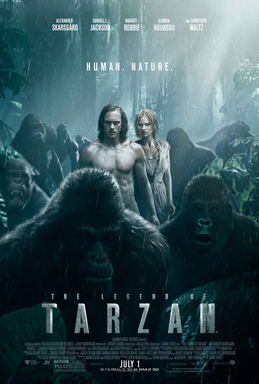Scattered across the long history of film sits a recurring character and his adventures within the jungles of Africa: Tarzan. Making his first debut during the silent era of films in the early 20th century, the fictional character has swung across multiple forms of film across numerous decades (including a few animated attempts) and we the audience have experienced the same basic story repeatedly with each subsequent retelling of his origins. But here comes Warner Bros. and their iteration of the character – a new attempt at recreating classic tales following their abysmal effort Pan last year, with the conceit, this time, being less of an origin and more of a sequel; set some time after the ape-man had moved away from his natural habitat and a part of society with wife Jane. And with Harry Potter and the Deathly Hallows director David Yates at the helm of a film that had both production issues and an iffy marketing campaign, can this new telling of The Legend of Tarzan be one that warrants the success the film's been having as of late?
In the late 19th century, the Belgium government is on the verge of bankruptcy, caused by a focus on railroad construction, and as a last resort has taken to extracting any and all riches hidden within the Congo (which Belgium and the UK share custody of). As such, the king's envoy Léon Rom (Christoph Waltz) attempts to obtain the mineral known as Opar from a tribe which resides there, but their chief Mbonga (Djimon Hounsou) offers an exchange: Rom can have the diamonds if he brings Tarzan (Alexander Skarsgård) and allows him to exact revenge on the former jungle dweller. This initially proves challenging, as eight years have passed since he left the jungle and he feels like a part of civilisation again is best for himself and wife Jane (Margot Robbie), but after George Washington Williams (Samuel L. Jackson) confides in him privately about how he believes the Belgium government are enslaving natives for their own benefits, he returns to his native land. But when the village he's residing at is attacked by Rom and his troop, Tarzan and Williams – alongside a group of natives – must team up to save Jane, stop Rom and save all the natives from becoming slaves.
So the story is simple – a reluctant Tarzan (or John Clayton III, as he prefers to be called for the majority of the film) must travel through his former home, and at one point butt heads with his former family who are now against him, to rescue his wife and in turn the natives of Africa. And one would be right to assume that the adventure, save for a few encounters with the wildlife, is a dull one; with not even the encounters being all that interesting due to how standard they are to other films released earlier this year (most notably The Jungle Book). What instead keeps the story interesting is the little flashbacks towards the titular character's origins: shown through a filter and coming around naturally, each return to the past makes for a far more interesting story despite being as formulaic as those that came before it. And despite the flourishes of reality with some of the characters (both Rom and Williams existed), it doesn't add much to what should have been a strong and engaging tale.
On the plus side, David Yates is at least presenting some form of fun behind the camera, as despite his recurring focus on a character's eyes and the arguably dull aesthetics around them (not to mention the sub-par special effects done on the gorillas; a great disservice to a key aspect of the Tarzan legacy) he's perhaps the only one flourishing in the jungle layouts and Victorian style. He's shown confidence before, and he shows it again here, albeit in a shorter fashion and one that doesn't overwhelm nor overly appeal to the mainstream moviegoer.
In the titular role, Alexander Skarsgård couldn't be any more bland. While he certainly looks the part, and he presents himself perfectly in the flashback sequences, the majority of the film has him looking rather stern and lacking in any true emotion. Even when reuniting with his wife in the end (not a spoiler, just basic fact) he comes across less like a hero who's saved the day and more of a man returning home from a 9-5 work day. Luckily for him, Margot Robbie holds more of the charm than her other half, as despite believing herself to not be a damsel in distress spends most of the time having lengthy conversations with her kidnapper – escaping briefly before being captured again nearly a minute later. But Robbie is still quite delightful in the role, with a sequence set in a tribal village where she often visited perhaps being a highlight solely for her interaction with her co-stars. Samuel L. Jackson as the surprisingly witty sidekick does bring about some level of entertainment, even if it may come to a disappointing representation of the real person he's portraying; Christoph Waltz is doing his Spectre performance again; Djimon Hounsou is underused as the tribal chief, with a total of two appearances across the entire film; and minor appearances from Jim Broadbent do little credit to the British actor.
The Legend of Tarzan can be criticised for a number of reasons – a lot of which stem from the film's lacklustre screenplay – but one can't deny that the film isn't at least a tad enjoyable. Sure, the pacing is slow and a couple of performances and lacking in any true character, but hidden within the realms of the film sits an interesting take on the character. Perhaps if the studio had more faith in themselves and had opted to leave this as a potential sequel years in the pipeline, most would have been more kind to this middling interpretation. 5/10.



No comments:
Post a Comment